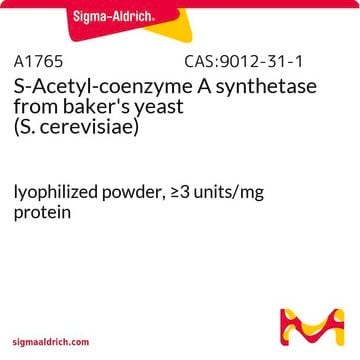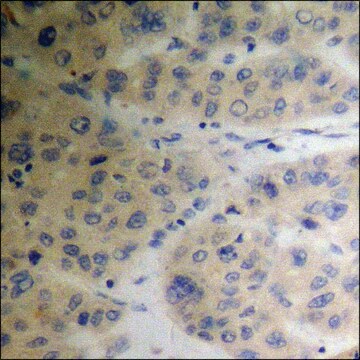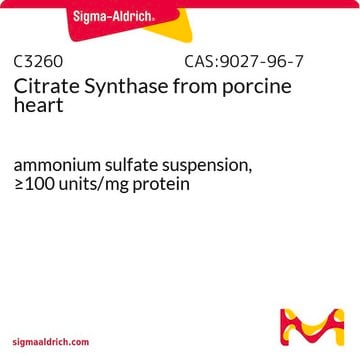P2783
Phosphotransacetylase from Bacillus stearothermophilus
lyophilized powder, ≥3,000 units/mg protein (biuret)
Sinónimos:
Acetyl-CoA:orthophosphate acetyltransferase, Phosphate acetyltransferase
About This Item
Productos recomendados
form
lyophilized powder
specific activity
≥3,000 units/mg protein (biuret)
composition
Protein, ≥20%
shipped in
wet ice
storage temp.
−20°C
¿Está buscando productos similares? Visita Guía de comparación de productos
Application
Biochem/physiol Actions
Unit Definition
Physical form
signalword
Warning
hcodes
Hazard Classifications
Eye Irrit. 2 - Skin Irrit. 2 - STOT SE 3
target_organs
Respiratory system
Storage Class
11 - Combustible Solids
wgk_germany
WGK 3
ppe
dust mask type N95 (US), Eyeshields, Gloves
Certificados de análisis (COA)
Busque Certificados de análisis (COA) introduciendo el número de lote del producto. Los números de lote se encuentran en la etiqueta del producto después de las palabras «Lot» o «Batch»
¿Ya tiene este producto?
Encuentre la documentación para los productos que ha comprado recientemente en la Biblioteca de documentos.
Artículos
Enzyme Reagent Coenzyme A (CoA, CoASH or HSCoA) is the key cofactor in first step of the TCA cycle, responsible for transferring the acetyl group from pyruvate oxidation to oxaloacetate yielding citrate. Available through Sigma-Aldrich online.
Enzyme Reagent Coenzyme A (CoA, CoASH or HSCoA) is the key cofactor in first step of the TCA cycle, responsible for transferring the acetyl group from pyruvate oxidation to oxaloacetate yielding citrate. Available through Sigma-Aldrich online.
Enzyme Reagent Coenzyme A (CoA, CoASH or HSCoA) is the key cofactor in first step of the TCA cycle, responsible for transferring the acetyl group from pyruvate oxidation to oxaloacetate yielding citrate. Available through Sigma-Aldrich online.
Enzyme Reagent Coenzyme A (CoA, CoASH or HSCoA) is the key cofactor in first step of the TCA cycle, responsible for transferring the acetyl group from pyruvate oxidation to oxaloacetate yielding citrate. Available through Sigma-Aldrich online.
Nuestro equipo de científicos tiene experiencia en todas las áreas de investigación: Ciencias de la vida, Ciencia de los materiales, Síntesis química, Cromatografía, Analítica y muchas otras.
Póngase en contacto con el Servicio técnico








